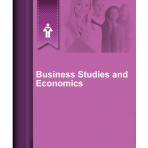Business Studies
A2 Revision Guide – People and Operations
This manual is one in a series of eight, written to cover the entire AQA syllabus. Each manual has a different author so the styles may well differ.
Why is this?
Some would argue that all authors should follow the same style so there is cohesiveness throughout. But Business Studies is not like that! Place ten experienced Business Studies teachers in a line ands they may all teach in a different way, in a different order with an emphasis on different parts of the syllabus.
Some teachers emphasise the numerical aspects; others emphasise decision-making. Some will stress the importance of definitions; others will spend hours on honing evaluative skills in pupils.
Eight manuals – eight styles. Enough for everyone!
This manual is in three sections:
Section 1 – a mind-map summary of the syllabus
Section 2 – the core of the manual
Section 3 – two pages of questions which when answered, summarise the syllabus.
Remembering that the idea behind this series is that all the manuals are photocopiable and handed round class for discussion, application and absorption great attention has been paid to slavishly following the syllabus. That said, at various points throughout, keen pupils are encouraged to research further areas not stated in the A2 syllabus. Nothing like encouraging further investigation!
No time – and space – is wasted in describing the syllabus or the requirements of the examination. All pupils should have a copy of the syllabus – in fact the first two pages are for pupils to complete. Rather than give a list of definitions that may just be glossed over, far better for pupils to carry out their own research. Thus the ONLY time pupils are instructed to complete areas is in the first few pages of section 2 – and the final page. Of course as a photocopiable manual it is hoped that pupils will be adding to, commenting and highlighting areas throughout. Examples and extracts are also included – even though this is merely a summary manual. Examples bring concepts to life and help stress to pupils the importance of reading the news.
A2: Controlling Operations and Location Questions
Ten fully-developed comprehension questions covering such topics as: lean production; TQM; efficiency; stock control; capacity utilisation; product extension strategies; multi-nationals; demographics; location; Kaizen.
Applying de Bono
Edward de Bono is perhaps most famous for coining the term ‘lateral thinking’. De Bono writes, ‘Lateral thinking is concerned with change – with the escape from old ideas and the generation of new ones’. This book is about applying some of the de Bono thinking tools to various aspects of Business Studies.
The emphasis is on ‘application’. Firstly the tools are explained and examples are given. Then the reader is encouraged to try the tools out for him/herself. As this manual is photocopiable it is assumed that sections will be copied and handed round in class. With that in mind various exercises are set – and a month’s homework is given. Readers are asked to apply the tools to a wide variety of business ideas.
This innovative approach – original ideas and unorthodox tools – makes for very interesting lessons. Away from going through a textbook, line by line or closely following a heavily itemised syllabus, this manual encourages pupils to actually ‘think’ for themselves. To examine ideas, assess the feasibility – and quite possibly come up with improvements for products
AQA AS Revision Guide: External Influences and Objectives and Strategy
This manual is one in a series of eight, written to cover the entire AQA syllabus. Each manual has a different author so the styles may well differ.
Why is this?
Some would argue that all authors should follow the same style so there is cohesiveness throughout. But Business Studies is not like that! Place ten experienced Business Studies teachers in a line ands they may all teach in a different way, in a different order with an emphasis on different parts of the syllabus.
Some teachers emphasise the numerical aspects; others emphasise decision-making. Some will stress the importance of definitions; others will spend hours on honing evaluative skills in pupils.
Eight manuals – eight styles. Enough for everyone!
This manual is in three sections:
Section 1 – a mind-map summary of the syllabus
Section 2 – the core of the manual
Section 3 – a one page summary of all that has gone before.
Remembering that the idea behind this series is that all the manuals are photocopies and handed round class for discussion, application and absorption great attention has been paid to slavishly following the syllabus. That said, at various points throughout, keen pupils are encouraged to research further areas not stated in the AS syllabus. Nothing like encouraging further investigation!
No time – and space – is wasted in describing the syllabus or the requirements of the examination. All pupils should have a copy of the syllabus – in fact the first two pages are for pupils to complete. Rather than give a list of definitions that may just be glossed over far better for pupils to carry out their own research. Thus the ONLY time pupils are instructed to complete areas is in the first few pages of section 2. Of course as a photocopiable manual it is hoped that pupils will be adding to, commenting and highlighting areas throughout. Examples and extracts are also included – even though this is merely a summary manual. Examples bring concepts to life and help stress to pupils the importance of reading the news.
AQA AS Revision Guide: People and Operations
This manual is one in a series of eight, written to cover the entire AQA syllabus. Each manual has a different author so the styles may well differ.
Why is this?
Some would argue that all authors should follow the same style so there is cohesiveness throughout. But Business Studies is not like that! Place ten experienced Business Studies teachers in a line and they may all teach in a different way, in a different order with an emphasis on different parts of the syllabus.
Some teachers emphasise the numerical aspects; others emphasise decision-making. Some will stress the importance of definitions; others will spend hours on honing evaluative skills in pupils.
Eight manuals – eight styles. Enough for everyone!
This manual is in three sections:
Section 1 – a mind-map summary of the syllabus
Section 2 – the core of the manual
Section 3 – some further reading/investigation
Remembering that the idea behind this series is that all the manuals are photocopies and handed round class for discussion, application and absorption great attention has been paid to slavishly following the syllabus. That said, at various points throughout, keen pupils are encouraged to research further areas not stated in the AS syllabus. Nothing like encouraging further investigation!
No time – and space – is wasted in describing the syllabus or the requirements of the examination. All pupils should have a copy of the syllabus – in fact the first two pages are for pupils to complete. Rather than give a list of definitions that may just be glossed over far better for pupils to carry out their own research. Thus the ONLY time pupils are instructed to complete areas is in the first few pages of section 2. Of course as a photocopiable manual it is hoped that pupils will be adding to, commenting and highlighting areas throughout. Examples and extracts are also included – even though this is merely a summary manual. Examples bring concepts to life and help stress to pupils the importance of reading the news.




